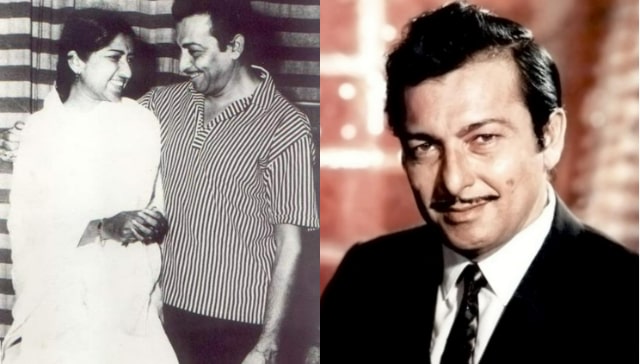It is now forty-seven years since we lost one of the greatest music composers of Hindi cinema.
Madan Mohan was much more than the ‘song’-total of the Ghazals for which he was so rightly crowned the emperor of the genre. He is best remembered for his precious Ghazals with
Lata Mangeshkar . Lag ja gale se is to the Madan Mohan-Lata Mangeshkar collaboration what the
Taj Mahal is to Agra. But is Lag ja gale se the best Ghazal that the two collaborated on? Not really. Believe it or not, there were greater compositions in their collaborative treasure chest. To name some superior classics randomly: Jab jab humein bulaya (
_Jahan Aara_ ), Agar mujhse mohabbat hai (Aap Ki Parchaiyan), Nainon mein badra chhaye (Mera Saaya), Aap ki nazron ne samjha (Anpadh), Unko yeh shikayat hai (Adalat), Jab yaad kissiki aati hai (title song). In an unpublished conversation with me on her favourite music composer Lataji had spoken about Madan Mohan’s neglected versatility. “He is know for his Ghazals. It is true that no composer could create Ghazals like Madan Bhaiyya, not only for me but
Talat Mehmood and
Mohammed Rafi . I really love Talat Saab’s Phir wohi sham wohi gham wohi tanhayee hai in the film Jahan Aara and Rafi Saab’s Aapke pehlu main aakar ro liye in Mera Saaya.” Lataji also lamented the fact that Madan Mohan’s non-ghazal compositions were neglected. “Although he was known for composing exceptional ghazals he was equally good at folk songs, like my sister
Asha ’s Jhumka gira re in Mera Saaya, or
Manna Dey ’s Kaun aaya mere manke dware in Dekh Kabira Roya or
Kishore Kumar ’s Simti si sharmayee si in Parwana. There was no limit to his creativity.” Lata Mangeshkar remembers how during the recording of a song for
Raj Khosla ’s Mera Saaya some discordant musicians felt the fire of Madan Mohan’s ire: “Madan Bhaiyya had learnt classical music and imbibed the best of the classical singers. It’s in this way that the strong foundation of musicianship is laid. He himself sang with a vigorous throat. That’s why his geet, ghazal and bhajan were so cogent. Madan bhaiyya was an artiste in the truest sense. And he was extremely melodious.In Mera Saaya He had composed a very melodious song (Naino Mein Badra Chaye) based on Raag Bhim Palasi. I was rehearsing before the mike when what did I see! On Madan bhaiyya’s face there was an anger instead of joy and it was increasing by the minute. Some musicians were playing off-key. Off-key music and Madan Mohan??!! No question of that. He sprang lividly towards the musician’s enclave. There was a glass door in between. Instead of opening it he hit the glass door forcefully. His hand was bleeding profusely. But he kept shouting “Besura Bajate Ho? Sur Ke Saath Beimaani Kar Rahe Ho? Sharam Nahi Aati (you play offkey? You are cheating on the tune? Shame on you!).” Lataji first met Madan Mohan at the Filmistan Studios.It was the year 1947, and she was beginning to get some recognition. Master Ghulam Haider had called her to record a song. She happily reached Filmistan studio. Lataji got to know that a very big film Shaheed was being shot. She had been called to record a duet for it. The person with whom she was supposed to sing this duet was someone named Madan Mohan. Lataji had never seen him before nor heard him sing. She also came to know that he was the son of the studio’s owner Rai Bahadur Chunnilal. It amused her no end. The duet that Lataji recorded with Madan Mohan was a song about sibling affection Pinjre Mein Bulbul Bole Mera Chota Sa Dil Doley. After the recording, she complemented Madan Mohan for his singing. Madan Mohan curtly informed her that he was going to be a composer and not a singer and that she will sing for him in his first project as a music composer. For some reason, Lataji couldn’t sing in his first film Aankhen. Madan Mohan was very unhappy about it. He took her home and said. “The first time we met, we sang a song about a brother and a sister. Today is Raksha Bandhan, come tie a raakhi on me. From today you’re my sister and I’m your Madan bhaiyya.’”
Madan Mohan was much more than the ‘song’-total of the Ghazals for which he was so rightly crowned the emperor of the genre.
Advertisement
End of Article
Written by Subhash K Jha
Subhash K Jha is a Patna-based journalist. He's been writing about Bollywood for long enough to know the industry inside out. see more


)
)
)
)
)
)
)
)
)



